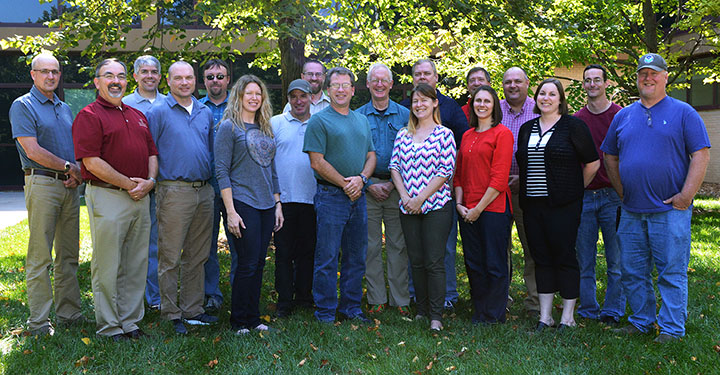
The High Plains Regional Climate Center recently organized a workshop on regional climate services for National Weather Service employees whose focus is the upper Missouri River Basin. Eleven participants from nine National Weather Service Offices came to Lincoln from Missouri, Montana, North Dakota, South Dakota and Wyoming.
“There is an overwhelming amount of climate data and information available these days. With the increasing demand for climate services, it is important to be aware of climate resources that are available and who provides them,” said Natalie Umphlett, HPRCC interim director and regional climatologist. “By building relationships among the climate services community in the Missouri River Basin, we can work together to provide efficient services for the region. My hope is that this workshop is merely a starting point for a long-lasting collaboration.”
Workshop objectives included: introducing participants to Regional Climate Services; providing hands-on experience with climate and drought tools; identifying opportunities for collaboration in the future; and building relationships and networks between participants from the local through national scales.
Staff from the HPRCC led workshop activities from Sept. 20 to 22, with special sessions by representatives from the State Climate Offices in Montana, Nebraska, North Dakota, South Dakota and Wyoming; the National Drought Mitigation Center; and the National Oceanic and Atmospheric Administration (NOAA).
Participants cited the workshop’s focus on practical uses of available climate tools and data storage as a strength of the program, which also has served as inspiration for others to host their own.
“The NOAA Great Lakes Regional Collaboration Team will be working with our sister center, the Midwestern Regional Climate Center, on hosting a workshop focused on Great Lakes issues next year,” Umphlett said.
In addition to hands-on training, participants also took several field trips, including to the Dairy Store and to a U.S. Climate Reference Network climate monitoring station located at Prairie Pines, a 145-acre property owned by Nebraska Forest Service at University of Nebraska-Lincoln, that has been transformed from farmland to an area of diverse woodland and grassland habitats. Of the 114 sites in the contiguous U.S., the Lincoln area is home to two USCRN sites, one at Prairie Pines and another at Spring Creek Prairie.
This workshop was the second in a series and was made possible with funding from the NOAA Central Region Collaboration Team. At least one more workshop is planned for 2017.
“The goal is to create a network of people who are not only knowledgeable of Regional Climate Services, but who can also participate and collaborate in applied climate research and outreach activities in the region,” Umphlett said.
Each workshop completed is one step closer to achieving that goal.
— Natural Resources
More details at: http://snr.unl.edu